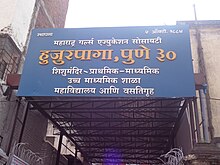
Huzurpaga is the oldest Indian run girls' high school in India. [1]

Huzurpaga is the oldest Indian run girls' high school in India. [1]

The school was established by the Maharashtra Girls Education Society (MGE) in 1885. [2] The school's founders included noted social reformers Vaman Abaji Modak, Justice Ranade and historian Dr. R. G. Bhandarkar. [3] [4] Ranade's then young wife, Ramabai Ranade had presented a petition to the governor of Bombay, James Ferguson in 1884 about the desirability of opening a high school for girls. Ferguson inaugurated the school in 1885. The school was originally called the Poona Native Girls High School (PNHS). It was the first Indian-run school to offer education to girls to the level of matriculation. [1] The school started with twelve girls, two of them widows. Mary Sorabji, sister of social reformer, Cornelia Sorabji was one of the first teachers. [5] The subjects taught included those required to appear for the matriculation examination such as English literature, arithmetics, geometry, Marathi, and science. Sanskrit was an optional language on the syllabus. [6] [1] The establishment of the school and its curriculum were vehemently opposed by Lokmanya Tilak in his newspapers, the Mahratta and Kesari. [7] [8] A play disparaging the English language curriculum went to second edition. The play also on ran on stage in Pune for many performances. [1] In 1887, the ruler of the Princely state of Sangli, Tatyasaheb Patwardhan, offered land on Laxmi Road in Pune, where the high school is based. The girls' hostel and the elementary school were established later on the same campus.
The school has offered a boarding option for out-of-town students for more than a century. The school and the boarding option were popular among the Bene Israel community in the early part of the 20th century. [9] [10] Notable boarders of school include Anandibai Karve and actress Reema Lagu.
In the 1990s, MGE started a new branch of the school in the Pune suburb of Katraj. It started with a preschool and gradually extended to include high school and higher secondary school, respectively.

The school is officially called the H. H. C. P. Girls High School in honor of Tatyasaheb Patwardhan's father, the Maharaja, His Highness Chintamanrao Patwardhan of Sangli. Huzurpaga is located in the main commercial area of Laxmi Road in Pune. The school location was historically used as horse stables for the Maratha cavalry during the days of Peshwa rule. The school opened its second branch at Katraj. In 2001, the MGE Society established a senior college of commerce exclusively for girls called Huzurpaga Mahila Vanijya Mahavidyalaya (HMVM). [11]
At present, the school offers instruction from grades 5 to 10 to nearly 2,400 girls. The school's medium of instruction is mainly Marathi with some students being offered the chance to learn science and maths through the English language. The latter option is called semi-English curriculum. In the S.S.C. exams conducted by the Maharashtra government for 10th grade students, the school consistently achieves a pass rate in the high 90s percentage.

Jyotirao Govindrao Phule was an Indian social activist, businessman, anti-caste social reformer and writer from Maharashtra. His work extended to many fields, including eradication of untouchability and the caste system and for his efforts in educating women and oppressed caste people. He and his wife, Savitribai Phule, were pioneers of women's education in India. Phule started his first school for girls in 1848 in Pune at Tatyasaheb Bhide's residence or Bhidewada. He, along with his followers, formed the Satyashodhak Samaj to attain equal rights for people from lower castes. People from all religions and castes could become a part of this association which worked for the upliftment of the oppressed classes. Phule is regarded as an important figure in the social reform movement in Maharashtra.The honorific Mahātmā, was first applied to him in 1888 at a special program honoring him in Mumbai.
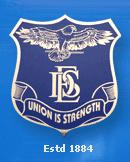
Fergusson College is an autonomous public-private college offering various courses in the streams of arts and science in the city of Pune, India. It was founded in 1885 by the Vaman Shriram Apte, Bal Gangadhar Tilak, Vishnushashtri Chiplunkar, Mahadeo Ballal Namjoshi and Gopal Ganesh Agarkar. Professor Vaman Shivram Apte was its first principal. Social reformer, journalist, thinker and educationist Gopal Ganesh Agarkar served as the second principal from August 1892, till his death in June 1895.
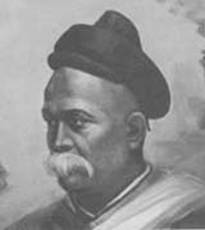
Rao Bahadur Mahadev Govind Ranade, popularly referred to as Nyayamurti Ranade or Justice Ranade, was an Indian scholar, social reformer, judge and author. He was one of the founding members of the Indian National Congress party and held several designations such as Member of The Bombay Legislative Council and Member of The Finance Committee at the centre. He was also a judge of the Bombay High Court, Maharashtra.

Irawati Karve was a pioneering Indian sociologist, anthropologist, educationist and writer from Maharashtra, India. She was one of the students of G.S. Ghurye, founder of Indian Sociology & Sociology in India. She has been claimed to be the first female Indian Sociologist.

Dhondo Keshav Karve, popularly known as Maharshi Karve, was a social reformer in India in the field of women's welfare. He advocated widow remarriage and he himself married a widow. Karve was a pioneer in promoting widows' education. He founded the first women's university in India, the SNDT Women's University in 1916. The Government of India awarded him with the highest civilian award, the Bharat Ratna, in 1958, the year of his 100th birthday. He organized a conference against the practice of devdasi. He started 'Anath balikashram' an orphanage for girls. His intention was to give education to all women and make them stand on their own feet. Through his efforts, the first women university was set up in 20th century.

The Chitpavan Brahmin or the Konkanastha Brahmin is a Hindu Maharashtrian Brahmin community inhabiting Konkan, the coastal region of the state of Maharashtra. Initially working as messengers and spies in the late seventeenth century, the community came into prominence during the 18th century when the heirs of Peshwa from the Bhat family of Balaji Vishwanath became the de facto rulers of the Maratha empire. Until the 18th century, the Chitpavans were held in low esteem by the Deshastha, the older established Brahmin community of Karnataka-Maharashtra region.
Shrikrishna Janardan Joshi (1915–1989) was a Marathi novelist from Maharashtra, India.

Sir Ramakrishna Gopal Bhandarkar, was an Indian scholar, orientalist, and social reformer.

Kothrud is an upmarket residential neighborhood in the city of Pune.
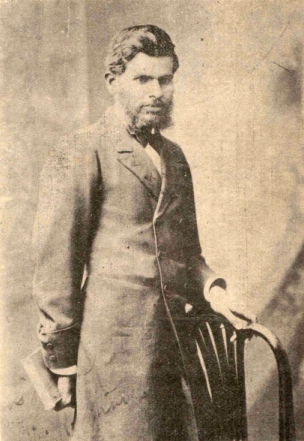
Vitthal Ramji Shinde was a social and religious reformer in Maharashtra, India. He was prominent among the liberal thinkers and reformists in India, prior to its independence. He has been recognised as a social reformer and an activist fighting for greater equality in Indian society. He is particularly noted for opposing the practice of 'untouchability', and for championing support and education for 'untouchables', such as Dalits.
Pune is the 9th most populous city in India and one of the largest in the state of Maharashtra.
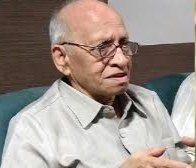
Mohan Ranade, was an Indian independence activist. He participated in Goa liberation movement, and spent fourteen years in Portuguese jail for the premeditated murder of a Goan policeman named Custodio Fernandes.
Madhav Julian was the pen name which Madhav Tryambak Patwardhan used in writing Marathi poetry.

The Deccan Education Society is an organisation that runs 43 education establishments in Maharashtra, India. Its main branch is situated in Pune.

Ramabai Ranade was an Indian social worker and one of the first women's rights activists in the early 20th century. At the age of 11, she was married to Justice Mahadev Govind Ranade, who was a distinguished Indian scholar and social reformer.

Poona Sarvajanik Sabha,, was a sociopolitical organisation in British Raj which started with the aim of working as a mediating body between the government and people of India and to popularise the peasants' legal rights.
Agashe is a surname used by Chitpavan Brahmins of the Kaushik gotra in the Marathi-populated Deccan in India and by the Chitpavan Brahmin diaspora across the globe.
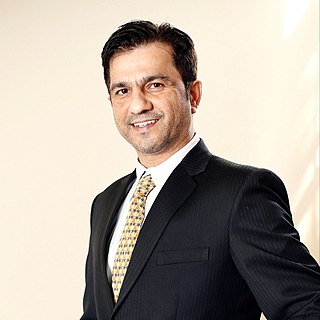
Ashutosh Agashe is an Indian cricket player and businessman. He played the Ranji Trophy for the Maharashtra cricket team from 1996 to 1999. He has served as the managing director of Brihan Maharashtra Sugar Syndicate Ltd. since 1996.
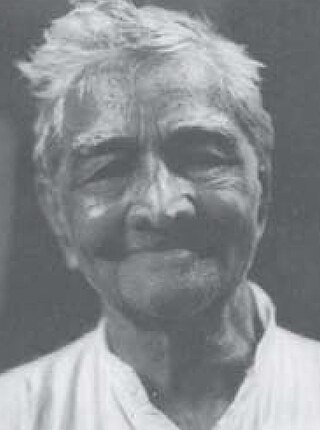
Dinkar Gangadhar Kelkar was an Indian writer, editor, art collector and historian. He is best remembered for establishing the Raja Dinkar Kelkar Museum in Pune.
ज्येष्ठ अभिनेत्री रिमा लागू १९७० ते १९७४ या कालावधीत हुजुरपागा शाळेत शिकत होत्या